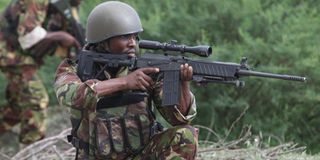Kenya in a fix as withdrawal of troops from Somalia nears

Kenya Defence Forces soldiers, under the Africa Union Mission in Somalia (Amisom), take an aim during patrol in Afmadow on November 22, 2015.
What you need to know:
- And now fresh concerns are emerging over Somali National Army’s (SNA) perceived unprofessionalism and lack of discipline of its soldiers.
- Only a couple of days ago, the SNA forces indiscriminately fired at another protest in Burahache.
As the 2021 withdrawal date for the forces in the African Union Mission in Somalia (Amisom) draws nearer, Kenya is faced with a big dilemma of whether or not to similarly exit from the war-torn country.
With the clock ticking, Kenya’s quandary is enhanced by her proximity to Somalia and the endless terror attacks staged by the Somali-based members of the Al-Shabaab terror gang targeting Kenyan civilians and crucial installations in the country.
And now fresh concerns are emerging over Somali National Army’s (SNA) perceived unprofessionalism and lack of discipline of its soldiers.
The indiscriminate shooting of Kenyan civilians at the Bula Hawa border point by SNA troops three days ago, has particularly irked local residents and raised the red flag on the Somali troops’ ability to independently, effectively and smoothly handle security operations in the absence of the Amisom forces, alongside the Kenya Defence Forces (KDF).
However, the incident is not the first of its kind. Only a couple of days ago, the SNA forces indiscriminately fired at another protest in Burahache. And on March 2, there was a major security scare in Mandera town, when the SNA and forces of the Jubaland federal state of Somalia exchanged fire on the Kenyan soil injuring several local residents.
Pull-out from Somalia
The apparent unprofessional conduct of the SNA, according to security observers, is reason enough for Amisom to reconsider its planned pull-out from Somalia: “The development is not only a demonstration of the forces challenge to ably handle security operations on its own once Amisom checks out, but raises fears of SNA poisoning relations with her Kenyan neighbours through provocative operations,” says Abdilatif Mohamoud, a human rights crusader from Mandera County.
But terming the latest ugly incidents at Bula Hawa and Burahache border points as isolated “and not part of SNA’s operational script”, Ahmed Adan, a security analyst from Somalia, describes the shootings of Kenyan civilians as “an act of cowardice and misdirected anger by a few frustrated soldiers” owing to poor pay and service conditions.
As AMISOM plans to gradually reduce its 22,000-strong AU forces in the country, Kenya’s primary interest is how to oblige without compromising the security of her own people. A senior security analyst, who confided in the Sunday Nation, says the weekend civilian attacks by SNA have raised grave concerns.
International relations
However, Dr George Katete, an international relations expert observes that KDF’s option of whether or not to pull out of Somalia is dependent on many factors, key among them being the larger interests of international powers players and the stand of regional and international politics.
“Kenya’s domestic interests aside, military presence is a very costly affair and one needs financial and logistical support. Nonetheless, there is good ground for Kenya to lobby to stay on or to be boosted in defending her borderlines,” says Dr Katete, who teaches at the University of Nairobi.
Describing the military as “a tool of a particular regime”, Dr Katete nonetheless observes that such a decision will largely depend on the interests of the regime of the day and it’s Commander-in-Chief: “A regime makes security-based decisions based on externalities and in this instance, it will have to be in sync with the interests of other regional and powerful international powers.”
Kenya is expected to assume her seat in the United Nations Security Council (UNSC) as a non-permanent member from early next year. Kenya can use the opportunity to push her case over the Somali question. “It may not be a veto seat, but nonetheless Kenya will have the opportunity to seat with some of the world’s powerful and influential nations, meaning we have ample room and special opportunity to lobby for our case on Somalia and SNA,” opines Dr Katete.
Addressing the UN Security Council on May 22, the head Amisom, Francisco Madeira, expressed reservations on the safe and smooth execution of the Somali Transition Plan (STN).




